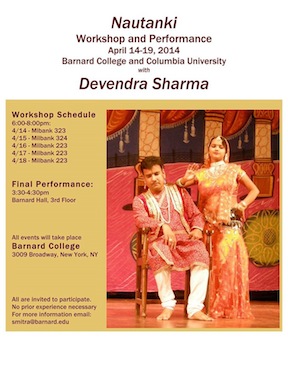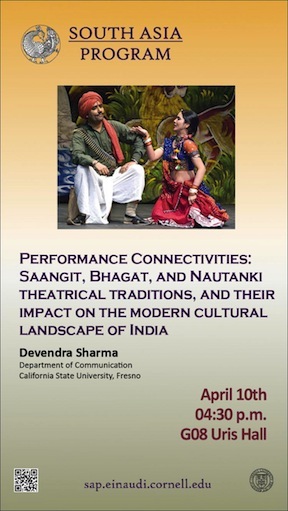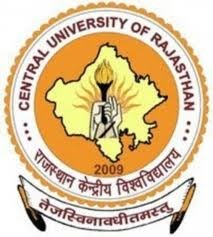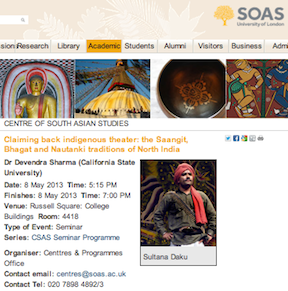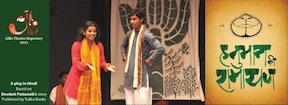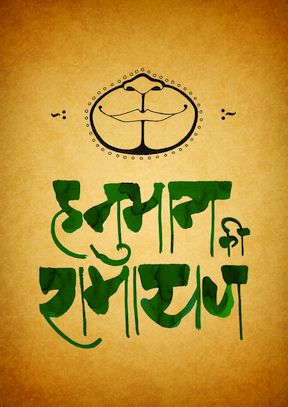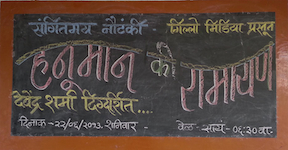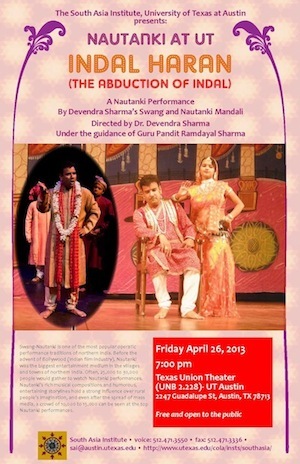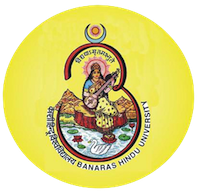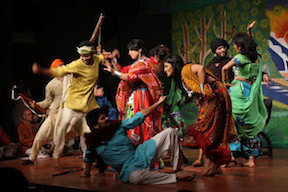"Taru": Radio Soap Opera and Participatory Theater Performances on
Women's Empowerment, Girl-child Literacy, Dowry, Overpopulation Control, and Health
in Rural Northern India
Population Communication International New York, a non-profit organization using entertainment communication strategies for social change, invited Dr. Devendra Sharma to become the technical advisor and researcher for their social entertainment education project entitled "Taru" from 2001-2005. "Taru" was a radio soap opera highlighting social issues such as women's empowerment, population, dowry, and the importance of girl-child literacy and health. It was broadcast in villages in northern India for a year. Dr. Sharma played multiple roles in this project. He co-facilitated a script workshop with Indian writers of the soap opera to effectively incorporate social issues in an entertaining storyline. Then, he wrote, directed, and organized live folk performances based on the radio soap opera's storyline. Then, he hired local folk troupes in the villages, and had a performance workshop with them, training them in the performance script he created. After that, Dr. Sharma organized a number of performances in the villages where these trained local folk troupes performed Dr. Sharma's script as a pre-publicity for the radio soap opera. During these performances, Dr. Sharma, with his colleagues, created radio listener groups for the upcoming soap opera. The radio listener grouper comprised young men and women in villages who committed themselves to listen to the soap opera regularly, and discuss the themes highlighted in it among themselves and with others in their village. They also committed to keep a diary of their discussions and impressions from the radio soap opera. Many of the members of these radio listener groups eventually not only listened to the soap opera, but got involved in its themes so much that they initiated many social change projects in their villages on their own. For instance, one group started a school for girls from poor families, who could not afford going to a regular school. The members from this group contributed money and resources to buy books, notebooks, pencils, and bags for the young girls. They also went from house to house to persuade the parents of these girls to send them to school rather than just use them for household work. In another village, radio listener group members started a school for so-called lower caste women in the village. These "lower caste" women had never gone to school and had no access to many privileges that "upper caste" women enjoy, such as education. There were other groups who also started similar schools in their respective villages. Some listener groups also worked hard to stop underage marriages of girls in their villages. In some parts of rural India, girls are stilled married off by their poor parents at a very young age (when they are between twelve and sixteen years old) to get rid of the financial responsibility that is connected with a girl's marriage (girls' parents have to give a huge amount of money in cash or in kind as dowry to the groom's family). The members were successful in stopping many of these marriages.
Book Chapter on Radio Soap Opera Listener Groups: Air cover and ground mobilization: Integrating entertainment-education broadcasts with community listening and service delivery in India
By the time the soap opera ended, these listener groups had become very strong and cohesive entities. The young members of these groups did not want to stop with the soap opera, and wanted to do even more for their communities, so they urged Dr. Sharma and the PCI team to help them do something more. Therefore, in 2004, Dr. Sharma organized a participatory theater workshop for youngsters from a cluster of villages in Bihar. In this workshop, these youngsters created their own scripts based on the social challenges they were facing in their villages. After writing and rehearsing their scripts, they performed them in front of the elders and community members in their villages. People from adjoining villages also attended these performances. The performances highlighted the controversial issues in their villages, such as dowry and unequal treatment of boys and girls. These youngsters worked with Dr. Sharma to cross many hurdles to participate in the workshop and perform. For instance, in the beginning, the high school girls interested in participating in the workshop were strictly forbidden by their parents to participate. They urged Dr. Sharma to intervene. Dr. Sharma spent at least three months to persuade the parents of these young girls to allow them to first attend the workshop and then to travel with the troupe to various neighboring villages to perform. In the process, Dr. Sharma became an integral part of the village community, and parents developed so much trust in him that they felt comfortable allowing their girls to mingle freely with young men and people from other villages. There were also many challenging moments during the workshop and performances where community members debated difficult issues such as dowry, equal treatment of boys and girls, and population. However, the youngsters were successful in facing all of these challenges and were able to voice their concerns. As a result of this project, young women and men of rural India got more empowered, became connected to each other, and were able to get the older generation to rethink many of its oppressive traditions and give more power to marginalized sections of the society, such as women and "low castes."
Book Chapter on Participatory Performances: Catalyzing social reform through participatory performances in rural India

